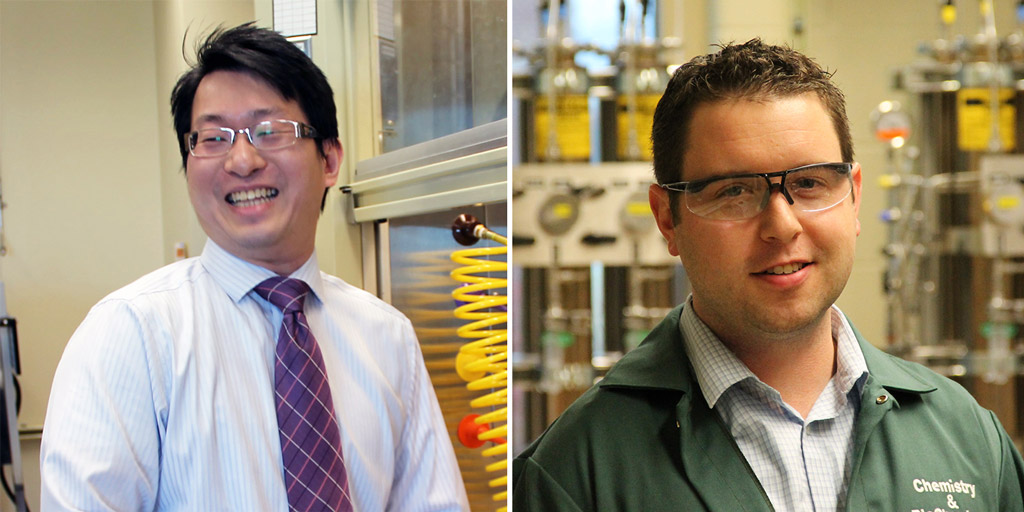Two Baylor professors earn prestigious National Science Foundation awards

Congratulations to the not one, but two Baylor professors, who have each earned one of the most coveted awards in the research world: the National Science Foundation CAREER award. Dr. Howard Lee, assistant professor of physics, and Dr. Caleb Martin, assistant professor of chemistry, have each been recognized for research efforts which could have huge implications for the future of our everyday electronic devices.
Lee (above left) received a five-year, $500,000 CAREER Award for developing ultra-thin, nanoscale optical films called “metasurfaces” with electrically tunable properties. What does that mean, you ask? Only a few hundred atoms thick, metasurfaces are “perfect absorbers,” because they can absorb 100% of the light that falls on them, and would significantly decrease the size and weight of optical devices — things like cameras, binoculars, microscopes, projectors, even phones and tablets — while increasing their efficiency.
“This [award] is also good for my students,” says Lee. “Because they have more resources and they know we are doing something great and we are competing with the top schools — MIT, Stanford and others — so they can get some confidence. We can actually show that we have projects that can really compete with [projects at] the top schools.”
This summer at his lab, Lee will begin hosting electro-optics students from nearby Texas State Technical College (TSTC) Waco to give them experience in nanotechnology. He’ll also partner with the Mayborn Museum in its Portal to the Public Network, designed to stimulate public interest in current research and innovation, and will give an introductory lecture on non-optics at the museum’s regular “Science Thursdays” events.
Martin (above right) has been awarded a $650,000 grant from the NSF. The funding directly supports Martin’s research in synthesizing analogues of benzene containing boron, which could improve the durability and performance of organic photovoltaic (OPV) solar cells and organic light emitting diodes (OLEDs).
Translation? The new technology could be used in devices such as smartphones, TVs and tablets, and could help bring electric power and technology to millions of people living in remote or underdeveloped regions.
“Already today … if you go camping, you can unroll a flexible organic solar panel and charge your phone or charge your battery. You can’t do that with inorganic solar devices because they are not flexible,” Martin says. “There’s a significant world population that doesn’t have access to energy, and it currently is not feasible to set up a grid in many areas. If you are in a Third World country, the benefits of a durable and portable energy source are enormous.”
The CAREER award also includes an educational component aimed at stimulating interest in science, technology, engineering and mathematics (STEM) disciplines among middle and high school students. Even before receiving his award, the Martin Research Group had been working with “The Cove,” a local nonprofit agency that serves area students who are homeless, to help introduce and raise interest in the STEM fields.
The grants are the most prestigious awards made by the NSF and are given in support of researchers who, though they’re early in their careers, already show potential as role models in research, in education and in carrying out their organization’s mission. It’s perhaps no surprise then that Drs. Lee and Martin were among the few to receive the award!
Sic ’em, Baylor professors!
You might also like:
* Nation’s largest award for top teaching brings UCLA chemistry prof to Baylor (Feb. 2018)
* Baylor prof receives international honor for research on psychology of religion (July 2017)
* Six Bears headed abroad thanks to prestigious Fulbright Awards (April 2017)

